You’ve been burning the midnight oil to get those backlinks, and sure, you’d love to see results YESTERDAY. But SEO reality is far from that. When instant results don’t show up, it’s easy to find yourself deep in Reddit threads titled “How long for backlinks to take effect?” This is where predicting SEO outcomes becomes a tricky game.
What’s even scarier? When clients start asking this question themselves! Well, in our experience, SIGNIFICANT RESULTS on average take 4 to 12 months, though it depends on a mix of factors. Ready to dig into what you can actually expect? Scroll down!
How Long Does It Take for Backlinks to Take Effect?
Let our latest Link Building stats shine some light! To find out how long it truly takes for backlinks to ramp up rankings and traffic, we surveyed 113 SEO experts from Europe, the US, the UK, Canada, and beyond.
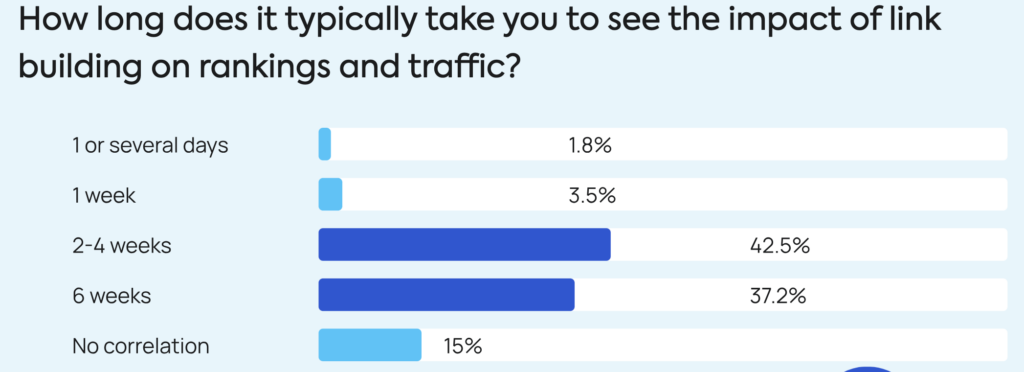
Turns out, nearly half of the experts (42.5%) say you’ll start seeing the impact of link building on rankings and traffic in just 2-4 weeks.
Often it depends on Google. For example, if there’s a core update. Sometimes, there’s periods of time when pages are slower to get crawled in general. However regardless of what’s happening with Google, I would give it at least 1 month before making any judgment
Another significant portion of experts (37.2%) vouched for 6 weeks. Interestingly, 15% of the surveyed didn’t see any impact on their rankings or traffic from link building.
Possible scenarios
To give you a hands-on idea of how long it takes for backlinks to work, let’s see how this would play out for different types of websites.
🎬 Positive Scenario: Well-Established Website with Strong Authority
Let’s take searchengineland.com, for example — a well-established SEO resource with high domain authority, tons of traffic, and a solid lineup of quality backlinks.
💼 Case: We publish at Searchengineland.com an article on "8 link building services to consider for higher rankings in 2025"
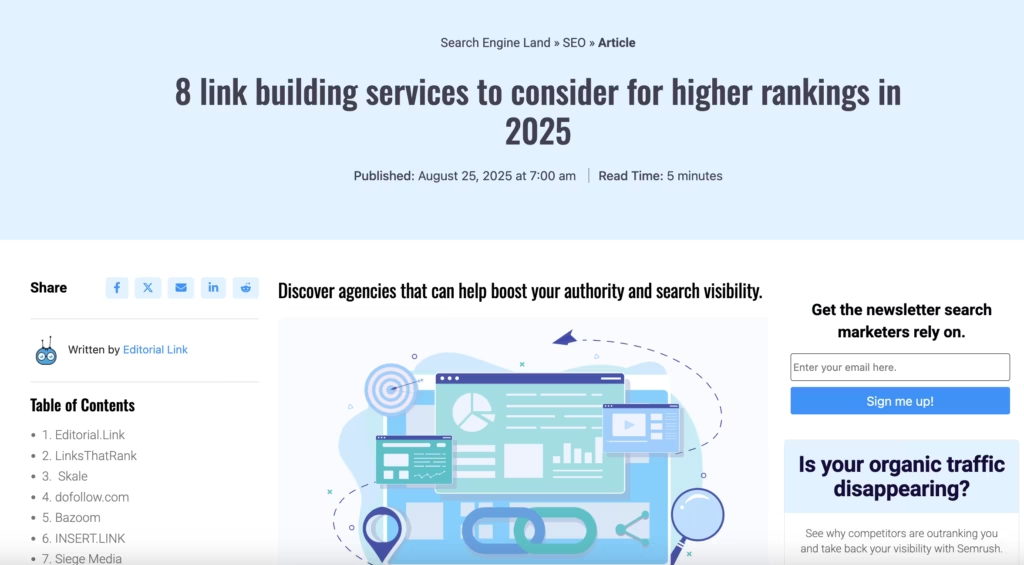
🚀 Immediate backlink impact: The new guide draws 16 backlinks from other top SEO blogs and websites, just in a 2 month!
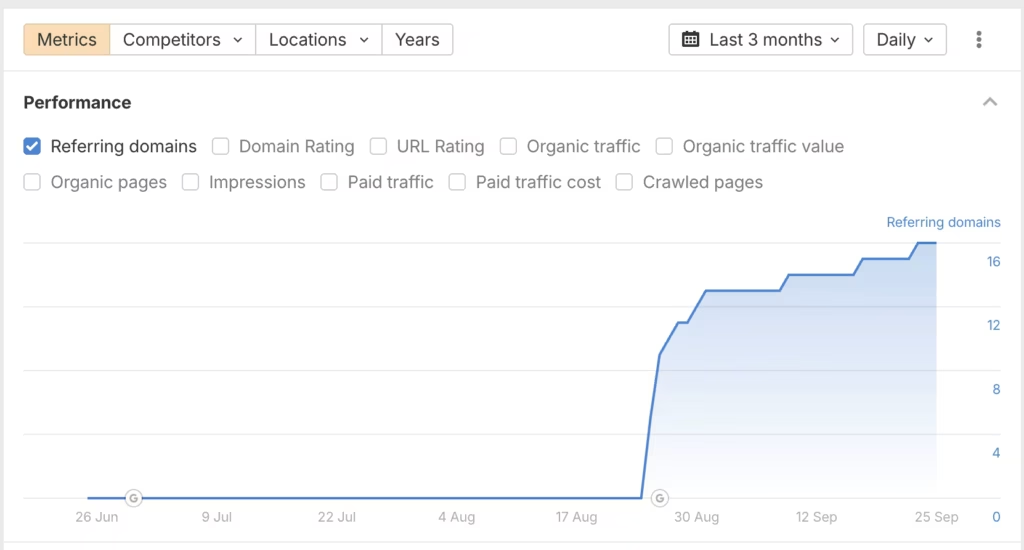
Plus, it quickly climbs to the top spots for related keywords too!
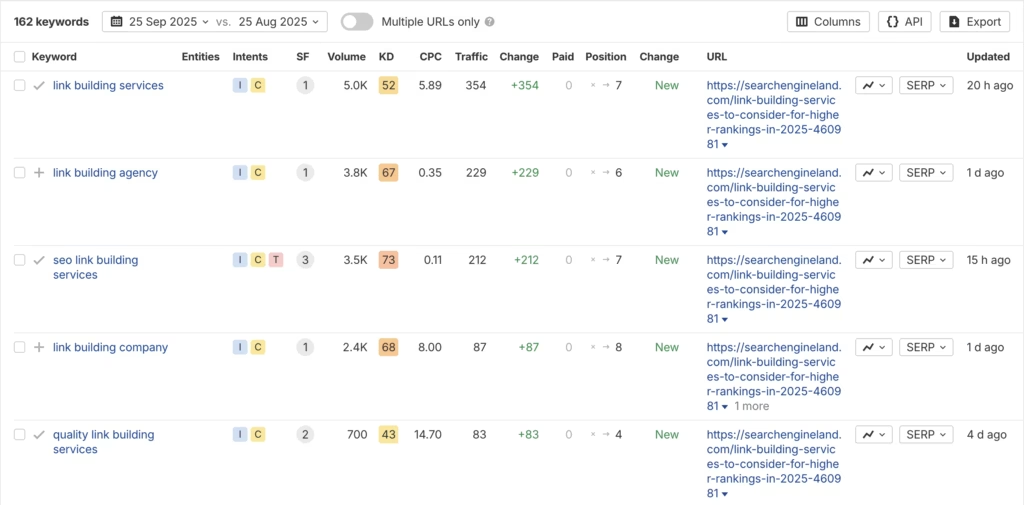
💬 Reasons: The article can quickly hit the first page of search results because:
- Existing Authority: With its strong reputation and plenty of backlinks, the website helps the new content rank quickly.
- Trust Flow: Search engines trust content posted by searchengineland.com thanks to its existing authority.
- Fast Indexing: Google’s bots regularly crawl searchengineland.com, so new content gets indexed in no time, including the content of the newly-linked external websites.
According to an Ahrefs study, the "age" of your page has a direct impact on reaching top rankings. The study found that nearly 95% of newly published pages don’t make it to the Top 10 within a year. Of the few that do, most manage to get there in about 2-6 months.
🎤 Ask an expert!
“When analyzing backlink effectiveness, how do you separate the impact of recent backlinks from those acquired months or years earlier?”
When analyzing backlink effectiveness, we consider the age and quality of the links. Older, do-follow backlinks from high-authority sites tend to provide more benefits since they’ve had time to build up domain authority (DA). Newer backlinks, on the other hand, might not show their impact immediately because they need time to be indexed and recognized by Google
Key Factors Affecting How Quickly Backlinks Work
Yes, the strength of your backlink profile, links from high-DR sites, and your site's “age” all play a role in answering the question: “How long for backlinks to take effect?” However, link building wouldn’t be a slow game if other factors weren’t involved.
💡Pro-tip! Save this handy checklist to keep everything in mind when analyzing your performance. Maybe one of these factors is holding you back from reaching the top!
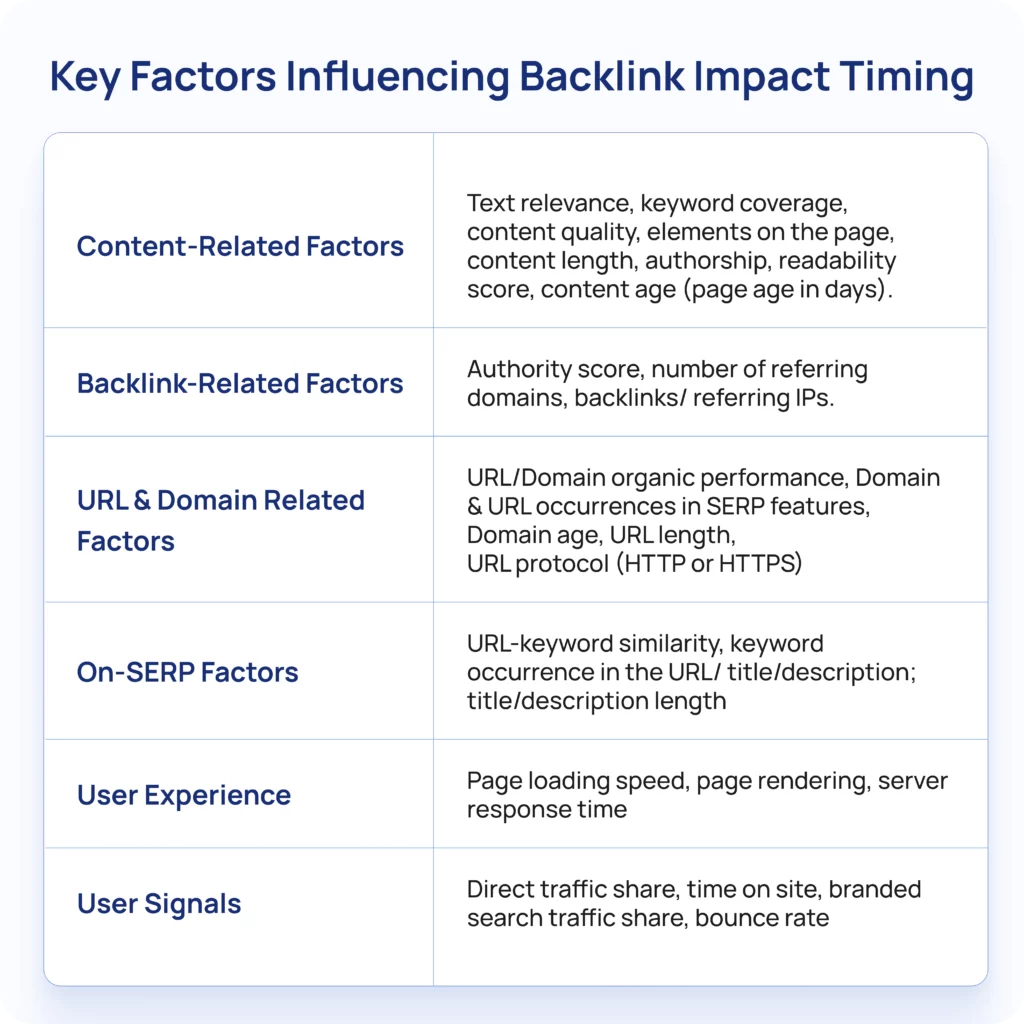
Whew, that’s a lot to consider! But if you need to focus on the core factors, keep these in mind:
Crawling & indexing
Without a doubt, to make your page shine, both factors are extremely important. First, search engines need to find (crawl) and analyze your newly published or updated content. If your site boasts high-quality backlinks, Google bots are more likely to find and crawl your pages FASTER.
Once a page is crawled, it needs to be indexed to show up in search results. Think of indexing as “storing” your page in Google’s database, where it can be retrieved and ranked. Pages with strong backlinks, especially those on reputable sites, are undoubtedly indexed sooner than most.
💡Pro-tip! Sometimes, your page might not rank well because Google doesn’t see it as index-worthy. To be on the safe side, resort to Google Search Console. Insert the page URL in the URL Inspection Tool and see if Google has indexed it or if there are any crawling issues to fix.
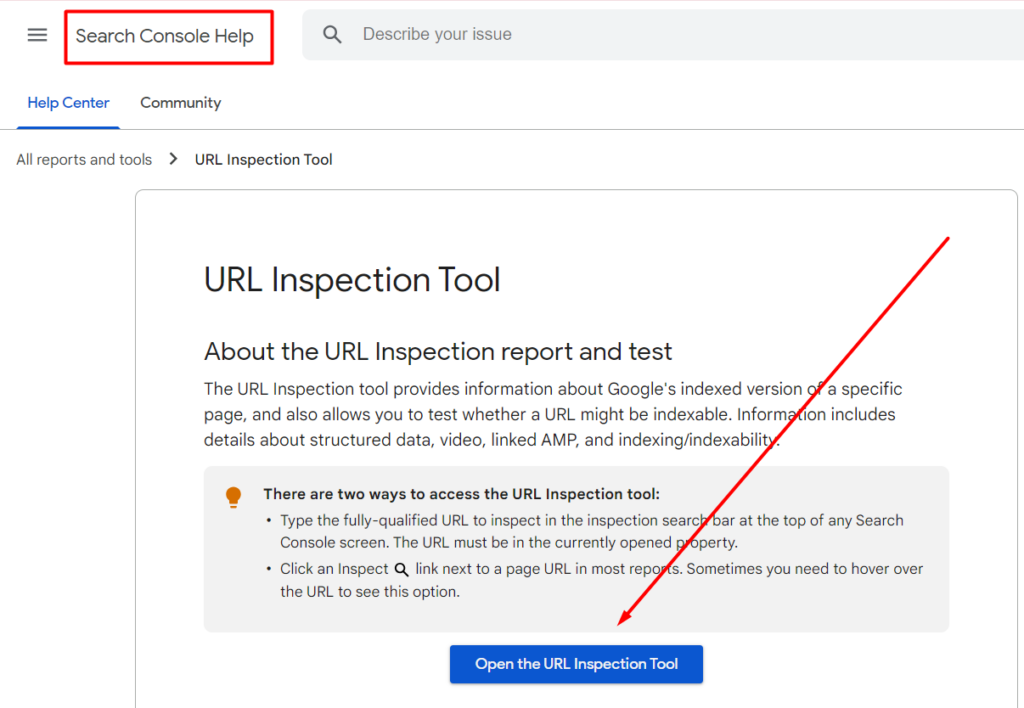
🎤 Ask an expert!
¨Can you identify any early indicators that suggest backlinks are beginning to take effect, even before rankings improve?¨
Yes, there are some early signs:
- More referral traffic: If a backlink is from a well-known site, you might see an increase in traffic from that site before your rankings improve.
- Greater brand awareness: High-quality backlinks can boost your brand’s visibility, leading to more online mentions and discussions.
- More frequent crawling by Google: When Google starts crawling your site more often, it can be a sign that it’s recognizing the value of new backlinks, which could lead to future ranking improvements.
Link velocity
Link velocity tracks how quickly and in what volumes your site is gaining new links. While it’s not a direct ranking factor, it could still make a difference for your performance. Google is a creature of balance, so the rate at which you gain backlinks can influence how it perceives your site’s credibility.
For example, a high link velocity can show that your site is growing quickly or gaining popularity. But if the rate is too fast, it might raise alarms with search engines, hinting at possible black hat link building use.
Anyway, if your link velocity stays steady and shows natural growth from trusted, authoritative sites, it can definitely help boost your SERP position.
💡Pro-tip! To gauge a natural link velocity for your site, check its historical link trends. You can definitely increase your link-building pace, but don’t go overboard. If you gained 10 links last week, aiming for 15 or 20 the next week is fine, but jumping to 500 is a red flag.
To find the RIGHT link velocity for your growth, team up with a reputable link buidling agency like Editorial.Link. We’re experts at securing high-quality backlinks from top-tier sites like podium.com, envato.com, cloudways.com, hubspot.com, and more. We know what natural link velocity looks like — and you can have it too!
🎤 Ask an expert!
“Can you provide examples of situations where high-quality backlinks had a delayed effect on rankings? What factors contributed to this delay?”
Absolutely! We’ve seen cases where even high-quality backlinks take some time to impact rankings. For instance, one of our partner companies got a great backlink from Techadvisor. However, it took about 1-2 months before Google indexed and approved it, and only then did we start seeing improvements in their rankings. This delay often happens because:
- Google takes time to notice the new link: It can be a while before Google crawls the page and indexes the backlink.
- Approval and processing: After indexing, it may take additional time for Google to assess the backlink’s value and apply it to rankings.
Domain & page authority
When you score a backlink from a highly authoritative site, it speeds up how quickly that link makes an impact. That’s because domains with a higher Authority Score are seen as more trustworthy and carry significant link power — the quantity and quality of backlinks that a website or page carries.
Semrush’s 2024 study on ranking factors found that the top-ranking pages often come from sites with a high Domain Authority Score. On average, the top 10 pages have a DAS of 67.42, with 100 being the highest possible score.
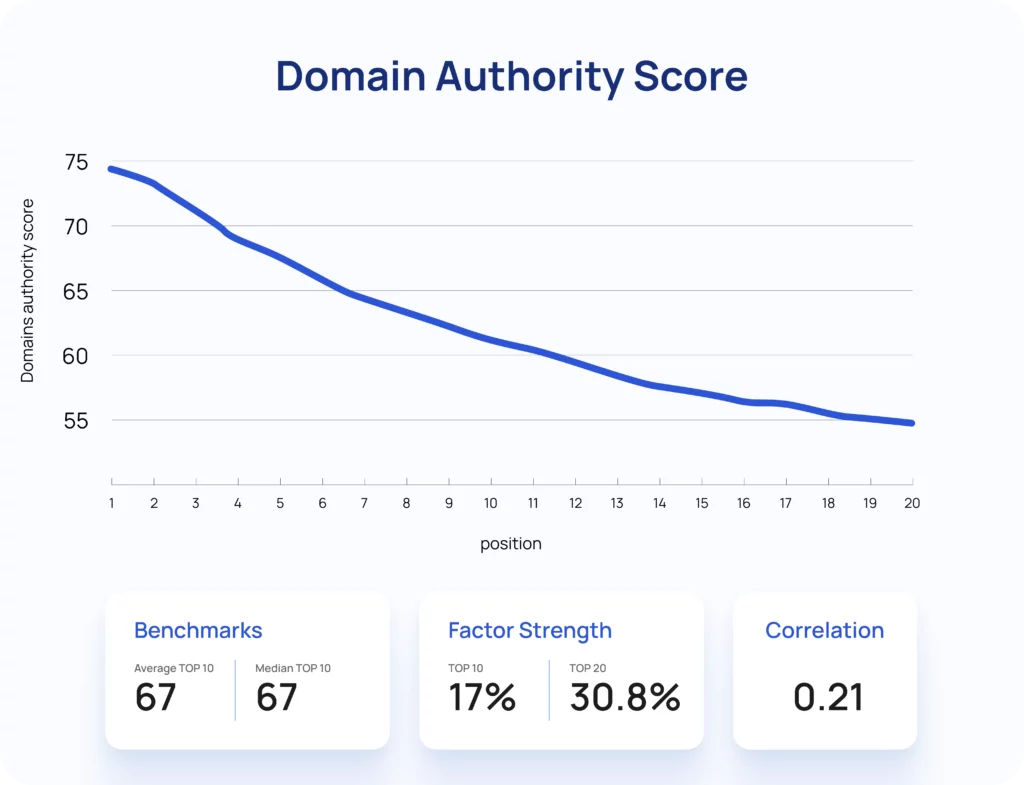
The same goes for the Page Authority Score. If you get a backlink from a page with strong traffic and credibility, that link packs more punch and can boost the impact of your backlink more quickly.
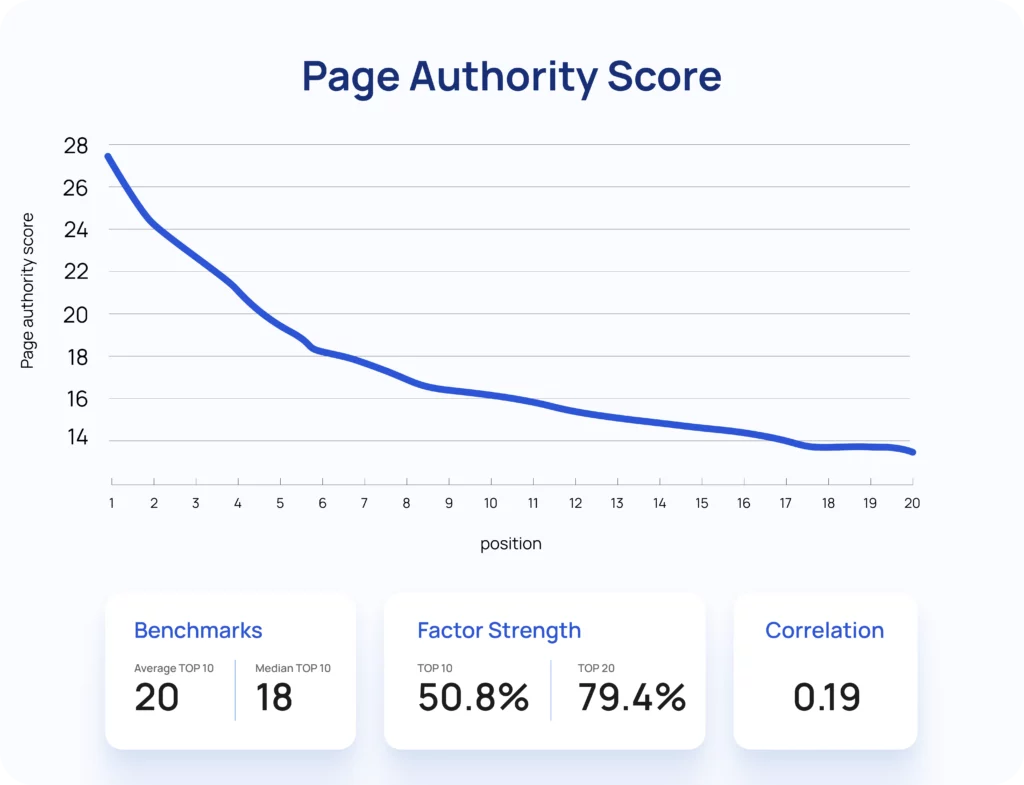
In simple terms, the stronger the source, the quicker and more effective the results.
Let's pull up a fresh example from our own experience. Not long ago, an Editorial.Link survey acquired a backlink from stanventures.com.

As you can see, it’s a page loaded with traffic and packed with organically searched keywords.
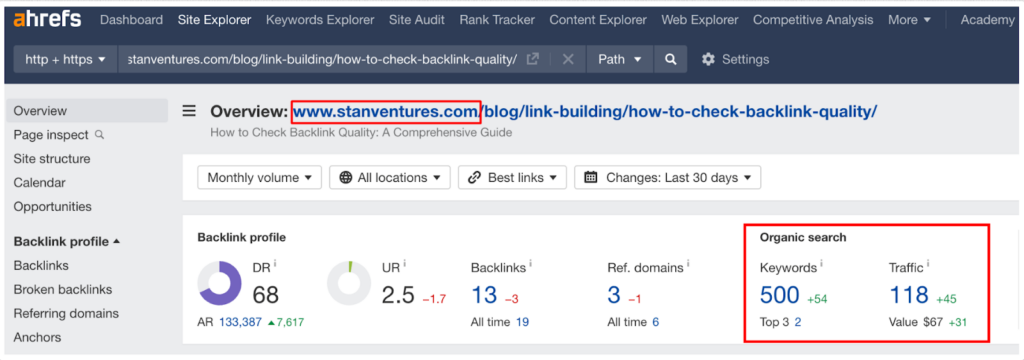
As a result, we saw a substantial boost in our organic keyword search numbers for this particular article.
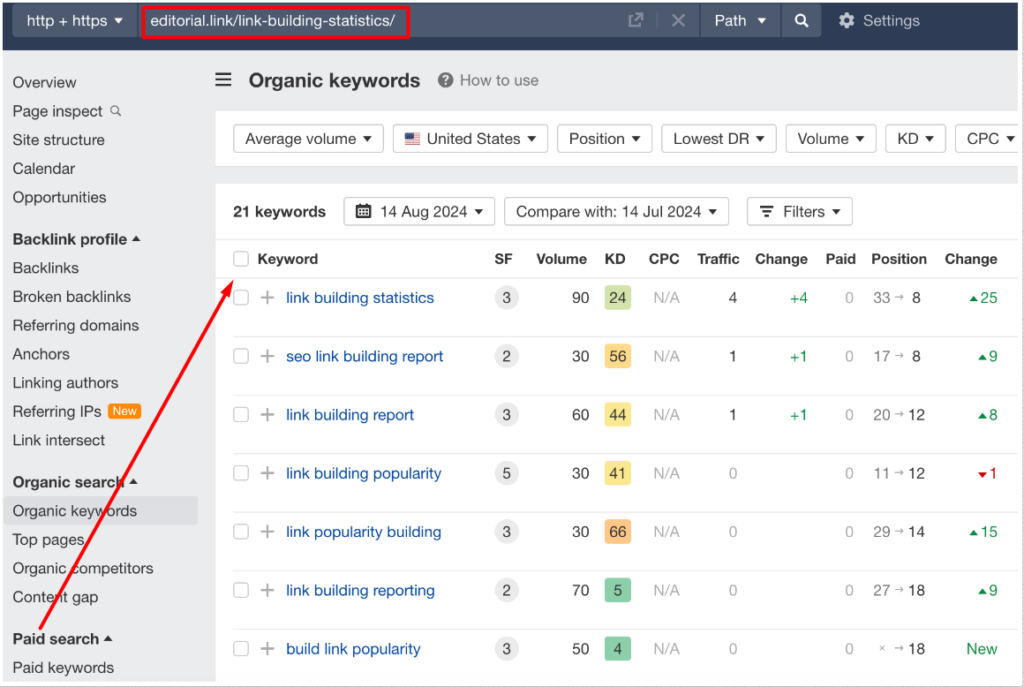
The link had a pretty quick impact because both Editorial.Link and stanventures.com have solid page authority. When high-authority sites link up, Google takes notice faster, giving your rankings a nice boost since search engines really trust these sources.
🎤 Ask an expert!
“Can seasonal fluctuations or industry trends alter the expected timeline for backlink effectiveness?”
Definitely. Seasonal changes and industry trends can impact how quickly backlinks show results. For instance, when Google releases a Core update, it can change how backlinks are valued, sometimes delaying or speeding up their effects. This is especially true in industries with strong seasonal patterns, where search behaviors and competition vary throughout the year.
Relevance
Another great way to answer the “How long for backlinks to take effect?” question is by pointing to link relevance. This is a key factor in Google’s Spam policies, which emphasize using relevant backlinks to ensure a high-quality user experience and to create helpful, reliable, people-first content — crucial if you want to rank high.
In fact, our earlier survey of SEO experts showed that 84.6% of respondents consider link relevance one of the top indicators of link quality.
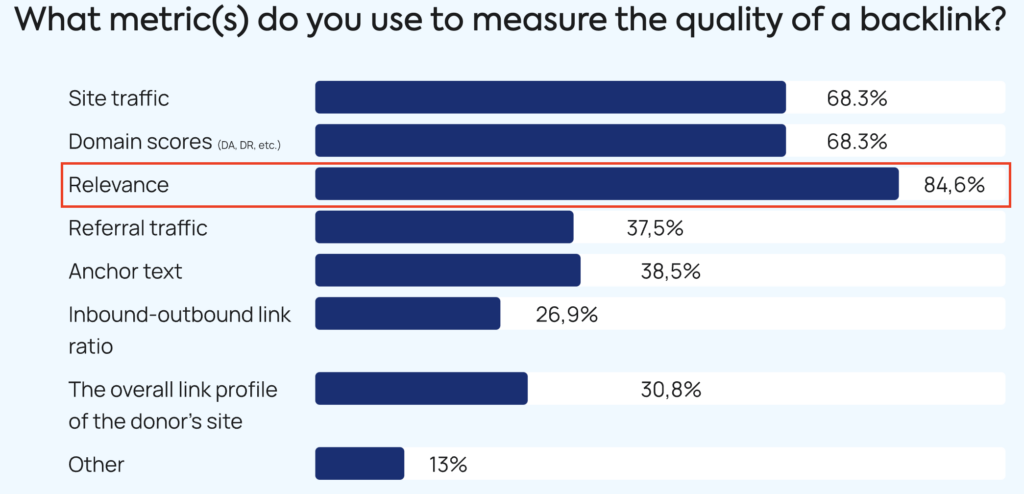
This gives us a lot to consider when picking sites to link to, since link relevance clearly outweighs domain scores and even site traffic, according to our experts. We couldn’t agree more!
A relevant link from a site that ranks well for topics like yours tells Google that an independent publisher thinks your page is valuable for their readers. It’s like getting a thumbs-up from a real person, showing that your content is useful and on-point!
For example, here at Editorial.Link, we frequently get backlinks from sites in similar niches or areas of expertise as ours. It’s great to be recognized and see others finding our content useful. Over time, these relevant links from high DR websites also boost our own traffic from organic keyword searches and mentions.
- mailtrap.io

- buzzstream.com
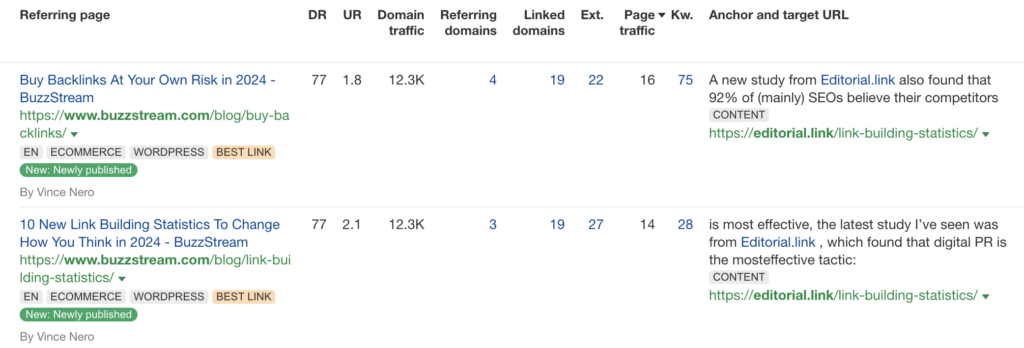
💡Pro-tip! If your page isn’t ranking well, it might be because there aren’t enough links pointing to it from other sites. Your competitors might just have more links from relevant, high-quality sites.
Backlinks from top-notch sites don’t just grow on trees. If you’re hitting a wall with building those crucial relationships, let the pros at Editorial.Link handle it. We’re known for forging strong ties with high-authority sites like podium.com, monday.com, namecheap.com, envato.com, and alike. Don’t let the lack of connections hold you back from climbing those rankings!
Anchor text
Don’t underestimate the importance of anchor text in SEO. It plays a crucial role in how your content is crawled and indexed. Google itself says that anchor text helps search engines understand the context of the linked page:
Most search engines associate the text of a link with the page that the link is on. In addition, we associate it with the page the link points to. This has several advantages. First, anchors often provide more accurate descriptions of web pages than the pages themselves. Second, anchors may exist for documents, which cannot be indexed by a text-based search engine, such as images, programs, and databases
However, over-optimization is a common pitfall with anchor texts. If your anchors are too perfect or repetitive, search engines might see them as spammy, which can hinder your rankings. To stay on the right track, use natural and varied anchor text. This approach helps you enhance your SEO without raising any red flags.
🎤 Ask an expert!
¨Have you encountered scenarios where backlinks actually had a negative effect on rankings initially before showing positive results?¨
Well, I’ve seen cases where websites have been negatively impacted by excessive use of naked links and anchor text stuffing, which can harm rankings and traffic. These tactics often stem from a misguided attempt to quickly improve DA or target specific keywords through internal linking.
Although we know that nowadays DR is easy to manipulate as well, most SEO tend to focus on raising this number up with backlinks as soon as they board clients, since it is a very good validity metric that clients put their eyes on and are prone to get a good impression from. Note that a website with a high domain authority is not necessarily a reputable source.
Competition
The essence of ranking high is all about staying competitive. Constantly ask yourself: Who's ranking above you? What are they doing differently? To outshine them, you need to understand their strategies and find ways to outperform them.
Sometimes, the reason you can't beat the competition isn't just about DR or the age of your page. It might come down to the quality of your content. Common content issues that could be holding you back include:
Shallow content
Your content might not be as in-depth or well-rounded as your competitors', and the format might not align with how readers prefer to consume information. For example, Google tends to rank videos higher because they offer more engaging, hands-on information.
Low content uniqueness
If Google is already ranking multiple pages on a topic with similar content, your page will face challenges. To stand out, your page must offer a unique perspective or approach. Merely directing users to the same products as countless other pages will not be enough to achieve a high ranking.
🎤 Ask an expert!
“Are there particular niches or industries where backlinks take significantly longer to show results? If so, why?”
Yes, in highly competitive industries like finance, health, and technology, it can take longer to see the effects of backlinks. These industries often require a lot of high-quality backlinks to make a difference in rankings. Additionally, industries with strict regulations may experience delays because content and backlinks are scrutinized more carefully.
Keyword difficulty
If a keyword has a very high Keyword Difficulty (KD) and the top positions are held by powerful websites, moving them down can be quite challenging.
For example, take the keyword "link building services."
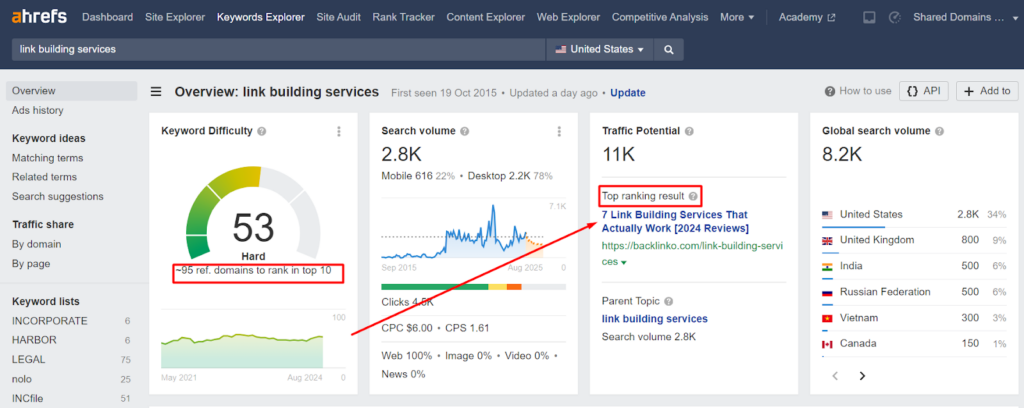
The metrics suggest you`d need to outplay around 95 domains to rank in 10. Crazy!
Going up against established sites like backlinko.com, linkbuilder.io, or searchengineland.com for this keyword is tough. They've held their spots for years, so bumping them down is no easy feat.
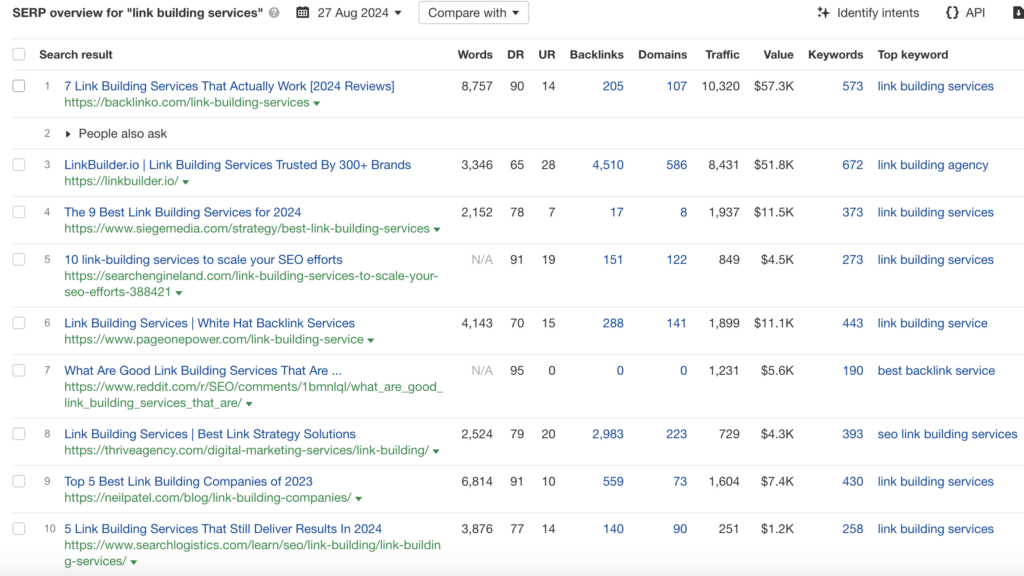
In this case, it’s smart to target a less popular related keyword or a matching term.
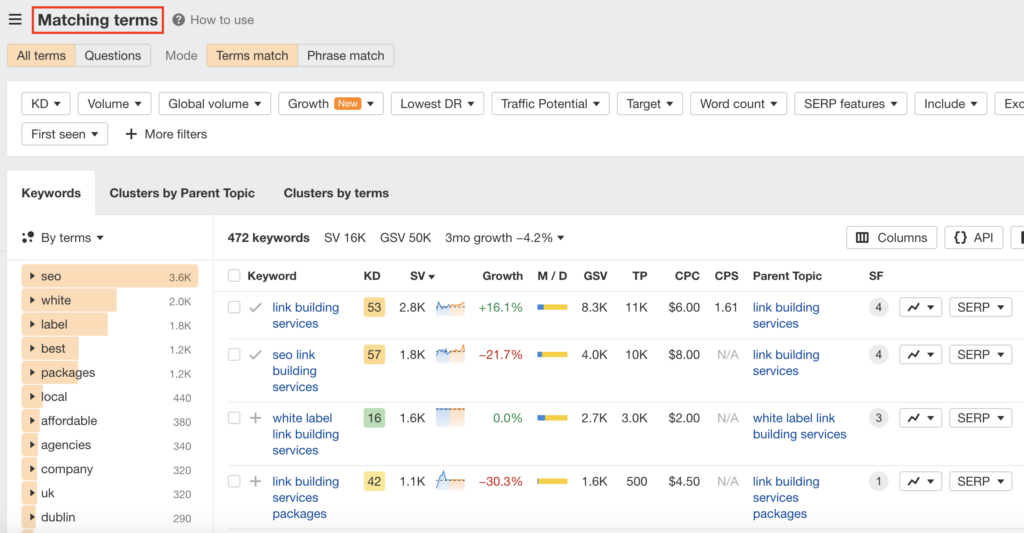
🎤 Ask an expert!
¨In your experience, what factors cause significant delays in seeing the effects of backlinks?¨
With 9 years in SEO, I’ve observed various timelines for link equity to impact authority. As Google’s algorithms evolve, timelines are becoming more consistent, but here are the top 3 delays I’ve seen:
- Crawling Speed: Google needs time to discover and process new backlinks, especially from lesser-known sites.
- Content Quality: Backlinks are most effective when they link to relevant, high-quality content. Poor content can delay benefits.
- Competition and Algorithm Changes: In competitive niches or during Google updates, the impact of backlinks might be less noticeable.
Remember, “seeing results from backlinks requires patience.
Backlink delays often come from factors like the site’s existing authority, the competitiveness of the keywords, and the time it takes for search engines to recrawl and index the new links. If the backlinks are from newly established sites, it might also take longer for their value to show up in the rankings.
Several things can slow down the effects of backlinks:
- Changing link type: If a website owner initially marks a backlink as do-follow (which passes on link value) and later changes it to no-follow, it can significantly delay or reduce the expected benefits.
- Slow indexing: Sometimes, Google might take a while to find and index new backlinks, especially if they’re on less popular pages.
- Page indexing issues: If the page where the backlink appears isn’t indexed by Google, or if it’s a non-canonical page (meaning Google doesn’t consider it the main version of that content), the backlink might have little to no effect on your rankings
Here are 4 factors that can cause delays in seeing backlink effects:
- You’re not using enough different link-building techniques: For example, you shouldn’t rely on one method only, like guest posts. Instead, you want to mix it up with digital PR and niche edits while creating linkable assets, too.
- Your link-building efforts appear unnatural: The pace of new links built is too high versus the existing website link profile. It can also come from a spammy anchor strategy, like overusing the same ones, especially exact match anchors.
- Google updates: After HCU updates in the fall of 2023, some websites were stuck on a downtrend for almost a year, even with good link-building efforts. We only started to see recovery after Google released a new core update in August 2024.
- Your onsite & technical SEO are lacking: Backlinks remain among the strongest ranking signals but don’t work as well if other aspects are neglected. You should also work on your onsite SEO & technical SEO to avoid seeing delays and maximize your backlinking strategy.
Final Thoughts
After all these tips, you should have a clearer answer to “How long for backlinks to take effect? Remember, link building isn’t about instant wins — you might need to wait anywhere from a month to a year. However, linking to authoritative sites and maintaining relevant connections can speed things up. Editorial.Link can cut down waiting time both for you and your clients.







